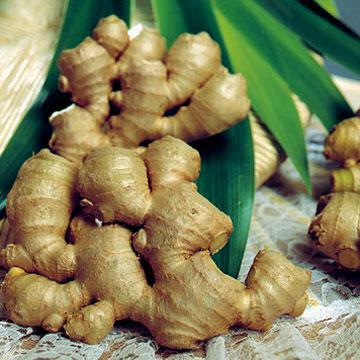
Ginger is one of the most widely used herbal remedies for morning nausea during pregnancy...
Ginger is a warming and strengthening oil with a soft, sweet woody-spicy scent.
Nature: warming, soothing, stimulating
It can be used in a massage blend to warm chilly limbs and ease stiffness.
Ideal as an inhalant or on a tissue to relieve morning or travel sickness.
Principal Actions: Eases nausea and digestive discomfort; warming properties stimulate circulation; analgesic to relieve muscular aches and pains.
Practical Uses
Methods of Use: application, aroma lamp, diffusor, inhaler, lightbulb ring, massage, mist spray
Circulation, Muscles & Joints
The analgesic properties of ginger make it a good choice in a hot compress to relieve arthritis, gout, headaches, muscular aches and pains, poor circulation, rheumatism, sprains and strains.
Hot Compress: Mix 3 drops ginger, 2 drops nutmeg, 3 drops sweet marjoram, 3 drops West Indian bay.
Respiratory System
Ginger is also used as an expectorant to help relieve respiratory ailments such as bronchitis, catarrh, congestion, coughs and laryngitis.
Decongestant Steam Inhalation: Mix 2 drops ginger, 3 drops eucalyptus, 3 drops pine in 2 cups (500ml) hot water.
Laryngitis: Mix 1 drop ginger, 1 drop pine and 3 drops lavender in 2 cups (500ml) hot water. Use in a steam inhalation.
Coughs: Mix 2 drops ginger, 3 drops eucalyptus, 2 drops oregano in 20ml/4tsp carrier oil and massage into chest and back twice a day, or use this blend in a steam inhalation.
Digestive System
Ginger has strong carminative, digestive and stomachic properties. It supports the digestive system for cases of diarrhoea, colic, cramp, flatulence, indigestion, loss of appetite and nausea.
Nausea: Mix 2 drops ginger, 2 drops fennel and 3 drops peppermint and use in a warm bath or add these to 20ml/4tsp carrier oil and massage into the abdomen. Add a few drops of this blend to a compress and apply to the affected area. Use as an inhalation.
To Ease Painful Digestion: Mix 2 drops ginger, 4 drops mandarin and 3 drops Scots pine in 20ml/4tsp carrier oil and massage into abdomen using circular clockwise strokes.
Ginger is a general stimulant to the entire body; it relieves dizziness and nausea from travel sickness and fatigue. Use 2 drops of ginger on a tissue and use as an inhalation.
Immune System
The warming properties of ginger provide symptomatic relief of chills, colds, influenza, fever and infectious disease.
Warming Blend: Mix 2 drops ginger, 2 drops black pepper, 2 drops sweet marjoram and add to a bath, or add this blend to 20ml/4tsp carrier oil and use in a massage at the onset of a cold.
Nervous System
Ginger is mood uplifting; improves mental clarity and memory; its soothing nature is helpful in situations of debility and nervous exhaustion.
Nervous Exhaustion: Mix 9 drops ginger, 10 drops geranium and 8 drops bergamot in a dark glass bottle. Use 4 – 6 drops of this in a diffusor; add 6 drops to a bath; add 10 drops to 20ml/4tsp carrier oil and use in a massage.
Safety Data: Non-toxic and non-irritant. Can be mildly sensitizing; avoid using if you have sensitive or allergy-prone skin.
Ginger in Aromatherapy
Botanical Name: Zingiber officinale
Note: Base
Parts Used: root
Source: steam distillation from the unpeeled, dried, ground root of the erect perennial herb with a thick, spreading, tuberous rhizome root. It is native to southern Asia, and has been extensively cultivated all over the tropics. Most of the oil is distilled in the UK, China and India.
Description and Odor Effect: a pale yellow, amber or greenish liquid with a warm, slightly green, fresh, woody-spicy scent. Its odor effect is warming and stimulating; a reputed aphrodisiac.
Blends well with: cedarwood, coriander, frankincense, patchouli, rose, rosewood, sandalwood, vetiver, lime, neroli, orange and other citrus oils
Therapeutic Properties: analgesic, antibacterial, anticoagulant, antiemetic, anti-inflammatory, antioxidant, antiscorbutic, antiseptic, antispasmodic, antitoxic, antitussive, aperitif, aperitive, aphrodisiac, astringent (stops bleeding), carminative, cephalic, diaphoretic, digestive (nausea), diuretic, emmenagogue, expectorant, febrifuge, laxative, rubefacient, stimulant (circulatory and nervous systems), stomachic, tonic, tonifying (digestive system), vermifuge
Safety Data: Non-toxic and non-irritant. Can be mildly sensitizing; avoid using if you have sensitive or allergy-prone skin.
Ginger – Quick Reference
Circulation, Muscles & Joints: arthritis, fatigue, muscular aches and pains, poor circulation, rheumatism, sprains, strains
Respiratory: catarrh, congestion, coughs, sinusitis, sore throat
Digestive: diarrhea, colic, cramp, flatulence, indigestion, loss of appetite, nausea, travel sickness
Immune: chills, colds, influenza, fever, infectious disease
Nervous: debility, nervous exhaustion
Keyword: Comforting
Ginger Magic: whole ginger roots are planted and grown to attract money or the powdered root is sprinkled into pockets or onto money for this purpose.
Ginger Harmony
Add these essential oils to 20 ml / 4 teaspoons carrier oil
To relieve digestive problems:
- 2 drops Ginger
- 4 drops Spearmint
- 4 drops Sweet Orange
If you appreciate the information provided,
please help keep this website running. Blessings!
© 2008-2025 aromaworx.ca. All rights reserved.

